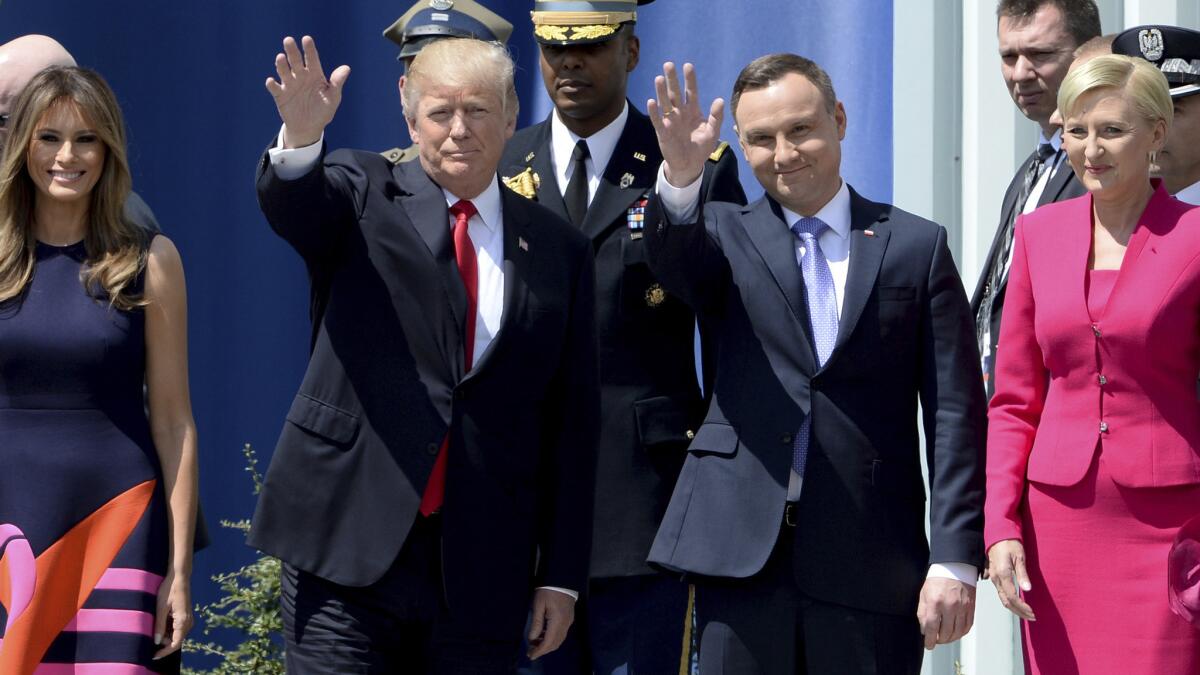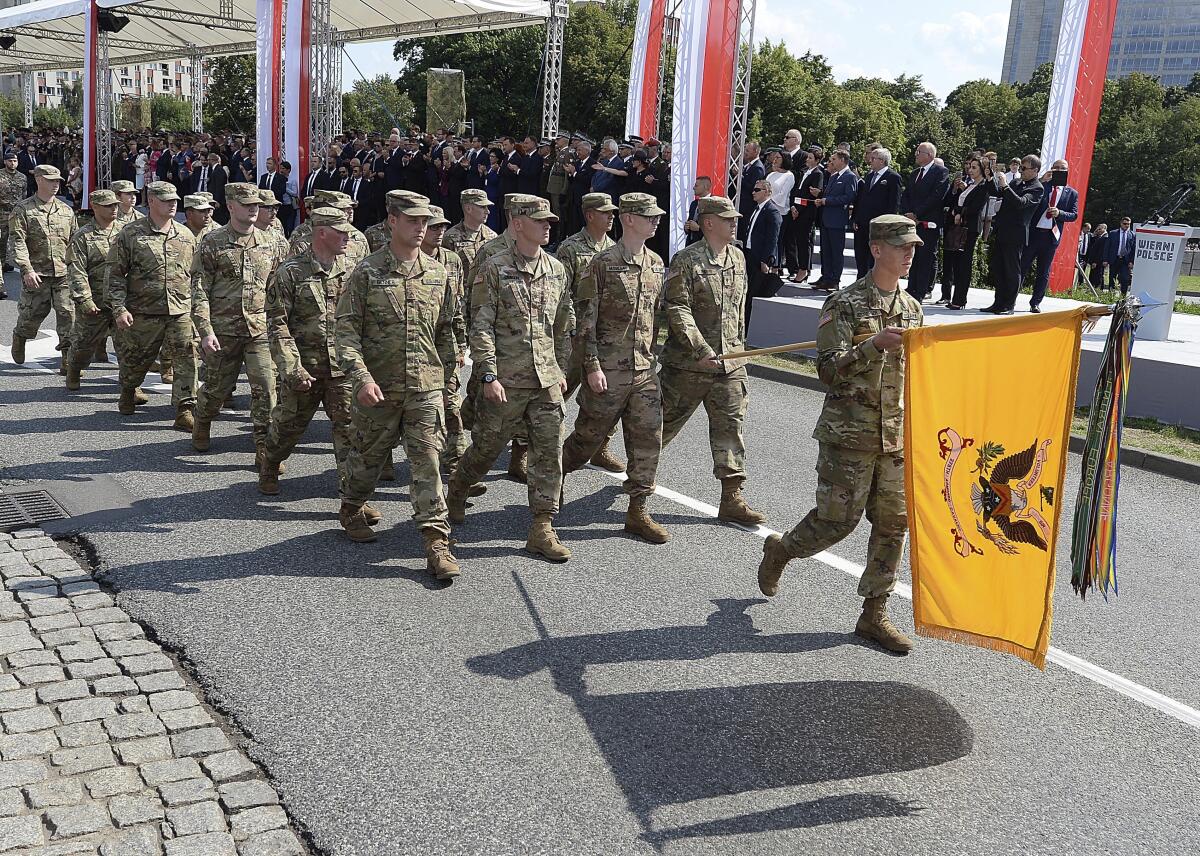Trump plans second visit to Poland although he probably wonât get a âFort Trumpâ

WASHINGTON â Update: President Trump on Thursday canceled his trip to Poland because of a hurricane approaching Florida. Read the update here.
Days after an uneven performance at the G-7 in France, President Trump returns to Europe on Saturday for his second visit to Poland, the latest sign of his embrace of right-wing leaders over traditional U.S. allies.
If Trump remains raw over his treatment from other world leaders at the Group of 7 summit in Biarritz â he insisted reports of disagreements were âfake newsâ despite clear friction with his counterparts â his two-night visit to Poland will likely prove a respite.
The U.S. president is on far friendlier terms with Polish President Andrzej Duda, who has been a reliable source of flattery and ideological camaraderie, than with the leaders of Germany and Canada, to name two allies with whom Trump has sparred.
He and Duda share nationalist views, such as fierce opposition to immigration, and a skepticism toward the European Union. Poland also is one of only eight countries in the 28-member NATO military alliance that meets its defense spending commitment. Trump has harshly criticized other members, especially Germany, for not spending 2% of their GDP on defense, the NATO standard.
âThe intensity of the U.S.-Polish bilateral relationship cannot be underestimated,â said Heather Conley, director of the Europe Program at the Center for Strategic and International Studies, a nonpartisan think tank in Washington.
As the highlight of his visit, Trump will attend a ceremony in Warsaw on Sunday marking 80 years since the start of World War II. The president previously attended the 100th anniversary of the end of World War I in France, and the 75th anniversary of the D-Day landings that marked a turning point in World War II.
The war begin in Poland on Sept. 1, 1939, when 1.5 million Nazi troops invaded Poland by land, the Luftwaffe bombed Polish airfields, and German warships and U-boats attacked Polish naval forces in the Baltic Sea. Britain and France declared war on Germany two days later.
Trump has embraced Duda and the ruling right-wing Law and Justice party, and his visit could bolster them in parliamentary elections in October. Trump also has tacitly approved of Dudaâs attempts to undermine Polandâs independent judiciary and free press, expressing confidence that democratic institutions were not endangered despite the alarm expressed by human rights groups and opposition politicians.
âItâs certainly a democracy. But itâs backsliding,â said Alina Polyakova, a foreign policy fellow at the non-partisan Brookings Institution. âItâs not Turkey. Itâs not Hungary. But itâs on the brink.â
Steve Sestanovich, a senior fellow at the Council on Foreign Relations, said the Polish government should be more wary of Trump as he squabbles with the European Union.
âI always say to my Polish friends, how will you benefit by helping Trump undermine these pillars of your own security and prosperity?â he said. âSome of them seem to think itâs possible for the United States to give up on the rest of Europe but not to give up on them. Thatâs a fantasy.â

When Duda visited the White House on June 12, Trump agreed to move 1,000 more U.S. troops to Poland, bolstering the roughly 4,500 military personnel deployed there as a hedge against possible aggression by Russia.
Hoping to gain Trumpâs favor, and get more U.S. troops, Duda floated a proposal last year to build a permanent U.S. military base in Poland and call it âFort Trump.â The Trump administration has balked at the idea, however, which could violate a 1997 agreement that bars the permanent basing of NATO troops in former Warsaw Pact countries.
Among other responsibilities, the U.S. troops train Polish pilots and maintain a NATO storage depot that could supply armored units if fighting breaks out in Eastern Europe. The new troops will add new reconnaissance capabilities and could support special operations forces if they were also deployed there.
Daniel Fried, a former U.S. ambassador to Poland who is now at the Atlantic Council think tank, said boosting the U.S. military presence in Poland will help deter Russian President Vladimir Putin, who sent troops into Ukraine and seized Crimea in 2014.
âIf we were seen as ambivalent or weak or uncertain with respect to Poland and the Baltic states, Putin may conclude that a more dramatic scenario was actually available to him,â Fried said.
âThis is moving in the right direction. It is solid stuff,â he added.
Trump has shown little concern about Moscow, however. In Biarritz, he repeated his calls for the G-7 to readmit Russia, which was expelled over its actions in Ukraine and Crimea.
Instead, Trump has portrayed the U.S. military deployment as a cudgel against Germany. Trump has feuded with Chancellor Angela Merkel over her countryâs trade policy and its defense spending, which does not meet the NATO standard.
âIt is offensive to assume that the U.S. taxpayers continue to pay for more than 50,000 Americans in Germany but the Germans get to spend their surplus on domestic programs,â Richard Grenell, the U.S. ambassador to Germany, said recently.
âPoland meets its 2% of GDP spending obligation towards NATO. Germany does not. We would welcome American troops in Germany to come to Poland,â tweeted the U.S. ambassador to Poland, Georgette Mosbacher, the same week.
Ben Hodges, who previously commanded U.S. Army forces in Europe, said those complaints could backfire because German politicians donât want to be seen placating Trump.
âThe current approach is having the opposite effect in Germany,â the retired lieutenant general said. âWe need to avoid punishing them in such an obvious public way.â
Moving most U.S. troops from Germany to Poland would pose a significant headache for the Pentagon, in any case, and Congress would probably balk.
Germany hosts a major airbase, military hospital and other facilities that are key for U.S. military operations in the Middle East and Africa. Extensive training grounds allow tank crews to conduct live-fire exercises, a setup that does not exist in Poland.
Hodges, who now is at the Center for European Policy Analysis, a Washington-based research institute, said the Trump administration should give Berlin credit for spending on cybersecurity and transportation infrastructure, which would be important in an armed conflict in Europe.
âI would say we need more German trains and not German tanks,â he said. âThatâs much more palatable to a German domestic population.â
Trump originally planned to visit Denmark after Poland. But the Scandinavian ally brushed off his quixotic quest to buy the vast island of Greenland, and Trump angrily canceled his state visit to Copenhagen, which was to include dinner with the Danish queen.
More to Read
Get the L.A. Times Politics newsletter
Deeply reported insights into legislation, politics and policy from Sacramento, Washington and beyond. In your inbox three times per week.
You may occasionally receive promotional content from the Los Angeles Times.











